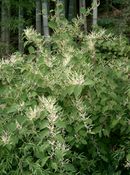Biological Invasions (2016) 18, 17-30
From Pestinfo-Wiki
 | Selected publication you are invited to contribute to the discussion section (above tab) |
Trans-national horizon scanning for invasive non-native species: a case study in western Europe
Biological Invasions 18 (1), 17-30
Abstract: Horizon scanning for high-risk invasive non-native species (INNS) is crucial in preparing and implementing measures to prevent introductions, as well as to focus efforts in the control of species already present. We initiated a trans-national horizon-scanning exercise focused on four countries in western Europe: Great Britain, France, Belgium and The Netherlands, which share similar environmental and socio-economic characteristics. We followed a structured four-step approach combining existing knowledge about INNS, with a collaborative identification of priorities for research and management: (1) systematic review of potential INNS of concern, (2) discrimination of INNS into an Alert and Black List depending on their absence or presence in the study area respectively, (3) risk analysis of the Alert List, and (4) expert ranking of species in the Black List. Amongst species not yet present in the four countries (i.e. Alert List), assessors reliably pointed to the Emerald ash-borer (Agrilus planipennis) and Sosnowski's hogweed (Heracleum sosnowskyi) as those INNS with the highest risk of invasion and impact. The Japanese knotweed (Fallopia japonica), Himalayan balsam (Impatiens glandulifera), zebra mussel (Dreissena polymorpha) and killer shrimp (Dikerogammarus villosus) were consistently highlighted as some of the most problematic INNS already present in the study area (i.e. Black List). The advantages of our combined approach include that it is inclusive of all-taxa, prioritizes both established and emerging biological threats across trans-national scales, and considers not only the ecological impact, but also potential direct economic consequences as well as the manageability of invasive species.
(The abstract is excluded from the Creative Commons licence and has been copied with permission by the publisher.)
Link to article at publishers website
Database assignments for author(s): Tim Adriaens
Research topic(s) for pests/diseases/weeds:
quarantine treatments/regulations/aspects
Pest and/or beneficial records:
| Beneficial | Pest/Disease/Weed | Crop/Product | Country | Quarant. |
|---|---|---|---|---|
| Reynoutria japonica (weed) | ||||
| Impatiens glandulifera (weed) | ||||
| Agrilus planipennis | ||||
| Heracleum sosnowskyi (weed) |